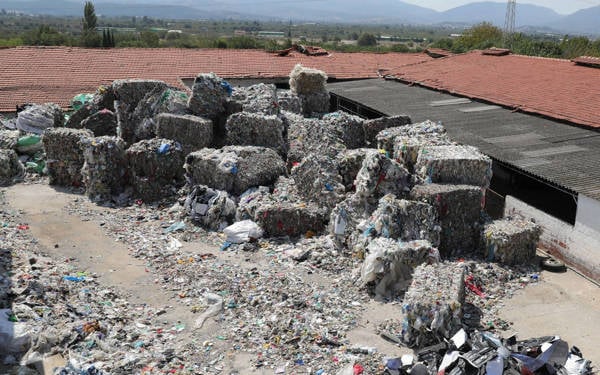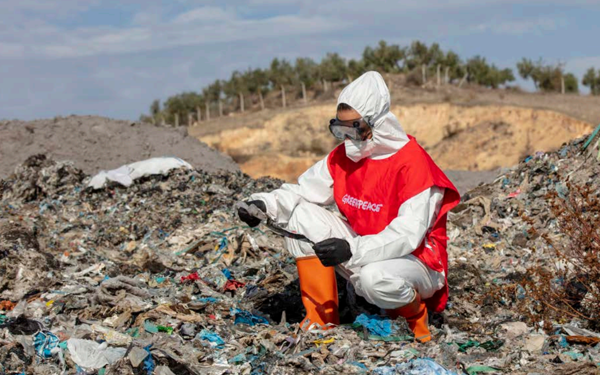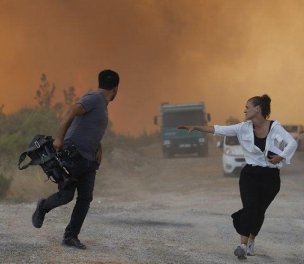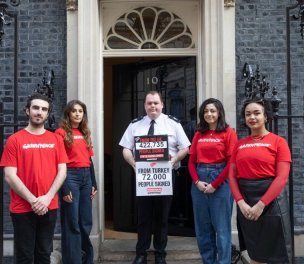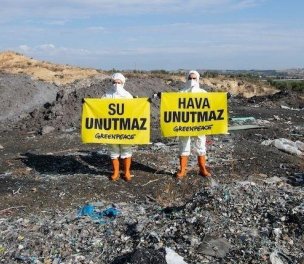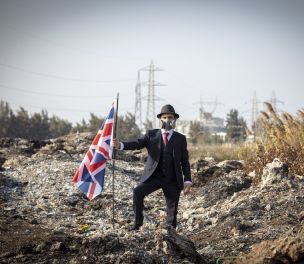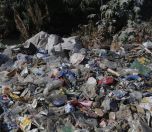*This article was published on atolyebia.org, the Communication Platform of Atölye BİA (BİA Workshop)
Click to read the article in Turkish
The plastic waste problem in Adana is still on the agenda. Çiğdem Özkan, the Communications Officer of Greenpeace Mediterranean, said recycling companies that cause plastic pollution in Adana have still not cleaned the 18 spots where plastic waste was found, even though they promised in April that they would clean the areas within a month.
After the expiration of the one-month period, the recycling companies wanted additional time and are trying to gloss over the issue so that it would be forgotten and not pursued, said Özkan. "The fact that they could not complete the cleaning in a month indicates that they don't have scientifically appropriate facilities, in other words, they do not have the capacity. If they did, they would have recycled [the waste] within a month, as they promised," she said.
After the plastic waste imported was allowed again on July 9, 2021, following a complete ban on May 18, 2021, the amount of plastic waste coming to Adana has reached a level that threatens public health.
In April, the private recycling firms that bring the waste to Turkey, after having talks with the parties to the issue and NGOs in Adana with the initiative of the AHBAP Association, promised to clean 18 locations with plastic waste within a month. However, no serious efforts to clean the areas have started to this day and the companies demanded additional time.
Özkan told bianet that it is very risky for the health of the people of Adana that the waste dumping sites are in agricultural areas and that the garbage is mixed into the soil, water and air after it was burned.
"Irreversible damages"
"The amount of dioxins and furans we detected in our research in Adana is the highest amount we have detected in Turkey so far. In recent studies, this amount was 400,000 times higher.
"As a result of our examinations on samples taken from five different dump sites within the provincial borders of Adana, we have found that there are toxic chemicals, many of which are known to be produced during the combustion of plastics, in all locations.
"In addition to these chemicals, heavy metals were also detected in the samples taken. Some chemicals found in this study can cause growth, hormonal, reproductive disorders, organ damage (liver and kidney), cardiovascular or respiratory diseases in children, and may trigger various types of cancer.
"When the samples were examined, high levels of chlorinated dioxins and furans, which cause serious health problems such as cancer, were found. Chemicals detected in scientific studies potentially cause diseases and affect the nervous system. In addition, these wastes cause irreversible damage to the environment and human health."
Dioxins and furans: These compounds are the byproducts of the combustion of materials containing chlorine, including some plastic wastes. They also emerge as a byproduct during the combustion of some pesticides or wastes. While they mostly enter the human body orally, their entry into the body is through breathing and drinking water. Since the disposal of wastes by burning them is widely used today, it is inevitable that dioxins and furans will threaten public health. Along with skin lesions and the suppression of the hormonal system and the immune system, dioxins and furans are known to have toxic effects on fetuses and trigger the formation of tumors. Polycyclic aromatic hydrocarbons (PAH): They are organic compounds that have carcinogenic and toxic effects, which appear as a result of the incomplete combustion of organic compounds. PAHs enter the human body through the air, water, foods and cigarette smoke and cause mutations in DNA. More than 100 PAH compounds have been detected in nature. However, 16 PAH compounds, which are thought to have more carcinogenic and toxic effects, are considered among the priority pollutants. |
No response from the ministry
They had shared the Game of Waste: Non-recyclable Lives reports, which they released on February 8, with the Ministry of Environment, Urbanization and Climate Change, but did not receive a response, Özkan noted.
In a report released by the ministry, no dangerous items were found and carcinogens were not measured, she said, adding that measurements were made for only some heavy metals.
While Greenpeace included carcinogens such as PAH, dioxins and furans, the ministry did not examine these. The two reports do not support each other, said Özkan.
People in Adana can no longer bear the smell of garbage in the city and the smell of orange blossoms are now replaced with the smell of burnt, smoke and garbage, she said. "If this problem is not eliminated by using the required scientific methods, it will be a great danger for future generations."
Turkey's insufficient recycling
According to the data that Özkan conveyed from Greenpeace's Game of Waste report, Turkey's plastic waste imports have increased by 196 times since 2004. The plastic use and production that have increased by 20 times in the last 50 years will be quadrupled by 2050. And 90 percent of the plastic that has been produced so far has not been recycled.
"The Ministry of Environment, Urbanization and Climate Change announced in the bulletin shared with the public in 2020 that it recycled 93,000 tons of plastic packaging waste in the first four months of 2020. However, considering that the amount of plastic waste imported to Turkey was 232,000 tons and Turkey's own plastic waste was 2 million tons, it is quite insufficient."
Data is not transparent
Another problem is that the data about recycling is not completely transparent and is not verified by reliable sources, said Özkan.
"Audit documents should be public because they are made for the public. These plastics take centuries to degrade in nature. Most plastics do not decompose regardless of environmental conditions. It is foreseen that it would be a right step to ban the import of plastic waste and to reduce plastic production in Turkey. Turkey should first establish the infrastructure that can transform its own plastic waste. How to clean up the garbage in Turkey is still a big question mark. The waste continues to accumulate."
Plastic waste import should be bannedGreenpeace's recommendations in the Game of Waste report: 1. Zero waste importation: As The Minister of Environment, Urbanization and Climate Change said at the end of 2019, Turkey should reach its goal of zero waste imports as soon as possible and immediately ban the import of all plastic waste. In accordance with the Turkish Zero Waste Regulation, separate collection systems at the source of local waste should be expanded. Single-use plastics should be removed from use within a plan, and their production should be limited. 2. Further investigations and rehabilitation plan: The Ministry of Environment, Urbanization and Climate Change should carry out more detailed investigations in the affected areas. In particular, they should examine the risk of hazardous substances leaking into air, soil, and water resources. A comprehensive rehabilitation action plan should be developed. This should involve the participation of citizens living in the region to clean and rehabilitate contaminated areas where imported plastic garbage is illegally dumped and burned. 3. Research Commission: The Presidency of the Turkish Grand National Assembly should establish a research commission to investigate the environmental destruction that results from illegal activities, with special emphasis on illegal and bad practices related to plastic pollution and plastic waste management. 4. Health impact studies: The Ministry of Health should carry out studies into the health impact of the pollution from imported plastic garbage, and provide preventive health support to the affected residents against possible adverse effects. The Ministry of Food, Agriculture, and Livestock should take seriously the potential of contaminated agricultural lands and irrigation water due to illegal plastic waste dumping and open burning activities near agricultural production areas. It should initiate studies to demonstrate that the relevant areas are risk-free in terms of food safety. 5. Transparency: The Ministry of Trade should explain in real-time, and in a transparent manner, the volume and nature of plastic waste that particular companies are importing from each country. Together with the Ministry of Environment, Urbanization, and Climate Change, these waste importing companies should state how much they produce and how much process waste they produce. The Ministry should establish a system in which the fate of these process wastes can be monitored and make it available to all. |
(SB/SO/NÖ/VK)






